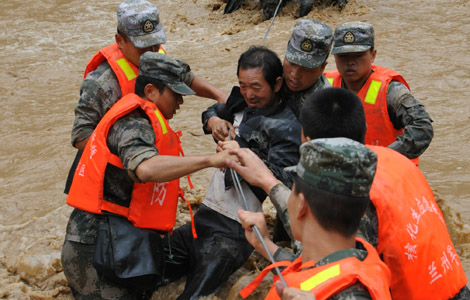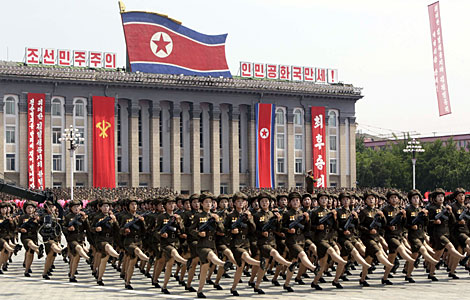Manila is on a mission impossible
Updated: 2013-07-29 07:09
By Wang Hui (China Daily)
|
||||||||
In his state of the nation address delivered on July 22, Philippine President Benigno Aquino avoided the territorial dispute with China in the South China Sea, a move perceived by some as showing "good judgment". But Aquino's sidestepping of the South China Sea dispute should not lure others into believing that the Philippines is keen on ratcheting down the tensions.
Actions speak louder than words. In January, Manila drummed up an attempt to seek an international arbitration tribunal verdict on the disputed territories. This is just another of the tricks Manila has been playing in recent years to try and claim for itself Chinese islands and islets in the South China Sea.
To build up the momentum for such an ill-advised quest, Manila has seized every opportunity to play up the issue of international arbitration, disregarding China's opposition and the regional consensus to resolve the South China Sea disputes at the bilateral level. Last week, the spokesman for the Philippine department of foreign affairs even said that it is now impossible for the country to continue bilateral discussions with China over the dispute and the country is seeking international arbitration under Annex VII of the United Nations Convention on the Laws of the Seas.
Manila's wishful thinking is that by evoking UNCLOS, to which both Beijing and Manila are a signatory nation, there might be a chance that the international court will support its ill-grounded maritime territorial claims, which will muddle the waters and taint China's image in the world arena.
However, its new farce is doomed to failure, as it does not have a legal basis for its claim.
True, under Annex VII of UNCLOS, countries with disputes over maritime territories could seek international arbitration. But, is UNCLOS applicable to the dispute between China and the Philippines in the South China Sea? A delve into the UN convention will tell us that the answer is probably not.
In fact, both countries have proclaimed they will not accept compulsory arbitration on territorial disputes. On August 25, 2006, in a statement submitted to the UN general-secretary, the Chinese government made a declaration in pursuance of Article 298 of UNCLOS, which allows States and entities to declare that they exclude the application of the compulsory binding procedures for the settlement of disputes, including arbitration. Other countries in the Asia-Pacific, such as Australia, the Republic of Korea and Thailand have issued similar statements.
For its part, the Philippines made a 2002 declaration that the signing of UNCLOS would not impair or prejudice the sovereignty it exercises over any territory. In other words, when it comes to territorial disputes, Manila too does not recognize UNCLOS. It is crystal clear then that the international court has no jurisdiction over the dispute between China and the Philippines.
So why is it so keen on pressing ahead with arbitration?
On Jan 22, Manila said it "does not seek a determination of which party enjoys sovereignty over the islands claimed by both of them". But it later also publicly stated that the purpose of initiating the arbitration was to achieve a "durable solution" to the dispute in the South China Sea between the two countries.
By initiating the arbitration on the basis of its illegal occupation, the Philippines has attempted to distort the basic facts, deny China's territorial sovereignty and hide its illegal occupation behind a cloak of legality.
The arbitration farce is also politically driven, as Aquino wants to divert his compatriots' attention from domestic problems and boost his own popularity through whipping up nationalistic sentiments in the country. But, the massive gathering of protesters in Manila on Monday while Aquino was delivering his speech sends a clear signal to Aquino that he cannot always pin his hopes on boosting popularity by playing the nationalism card.
As its arbitration antic is doomed to hit a wall, Manila should make a wise choice now. The Philippines should stop infringing upon China's territorial waters, refrain from internationalizing the dispute and opt for resolving the issue at the bilateral level.
The author is a senior writer with China Daily.
(China Daily USA 07/29/2013 page11)
Most Viewed
Editor's Picks

|

|

|

|

|

|
Today's Top News
Experts advise CEOs on how to make it in the US
Israeli-Palestinian peace talks to resume
Latest US-China talks should smooth the way
Audit targets local government debt
30 people killed in Italy coach accident
Brain drain may be world's worst
Industry cuts cloth to measure up to buyers' needs
Reckless projects undermine the prosperity hopes
US Weekly

|

|















